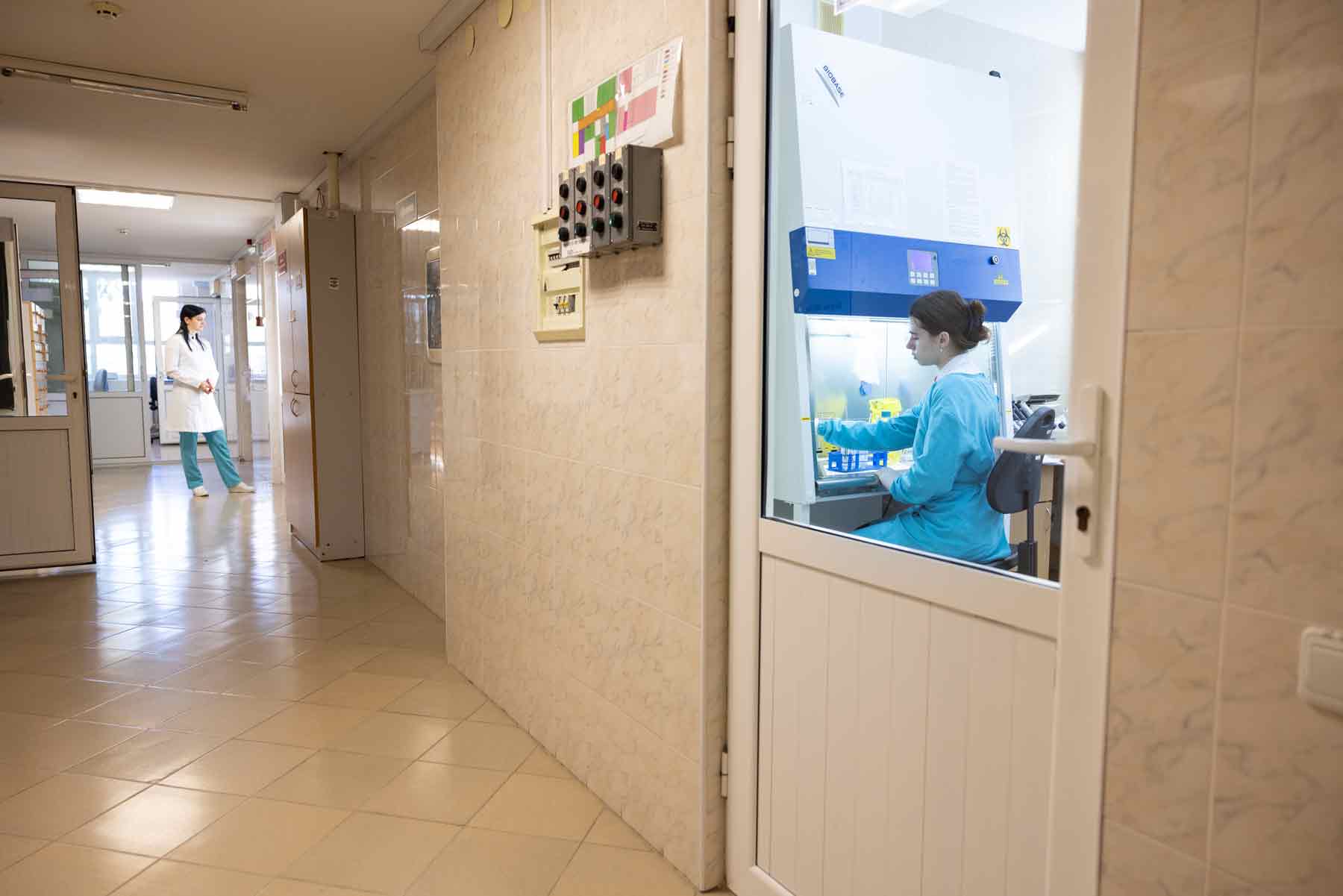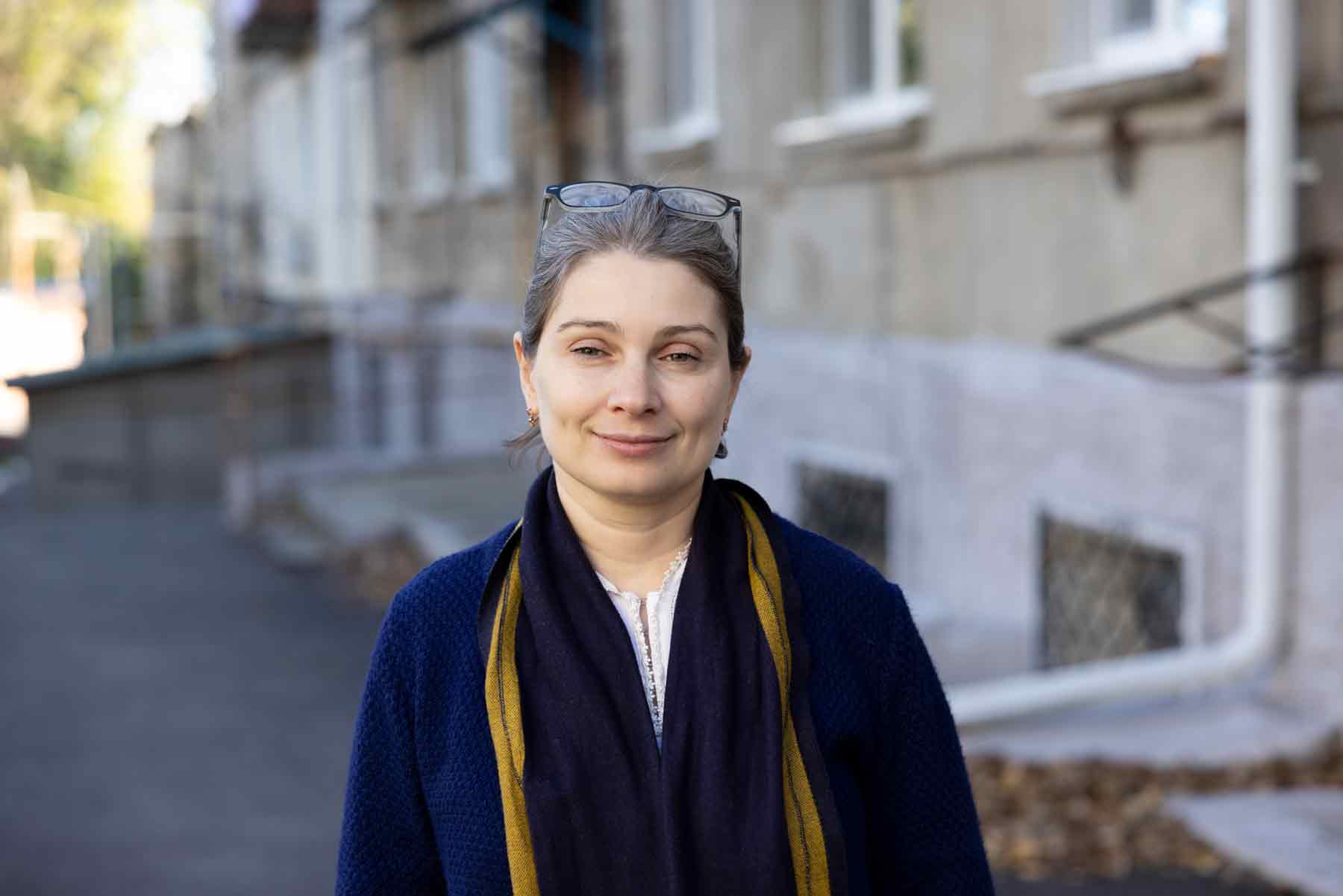If Olga had waited just a little longer before seeking help, she would probably not be alive. Battling tuberculosis (TB) was a traumatising experience, she recalls, something she does not wish on anyone.
The 41-year-old is standing in the living room of her house in Bălți, Moldova’s second largest city. A music programme is playing on the tube TV, and her children are gathering around her, including her eldest daughter and granddaughter who have come to visit. Here, the family sleeps – there is a crib for the toddler, a bed for Olga and her younger daughter, and padded chairs for the two boys.
When she got sick about three years ago, her youngest was only four months old. Her greatest concern at the time: that the treatment wouldn’t work and her children, now aged between three and 21 years, would be alone, the single mother recalls. Back then, Olga was employed at a car wash – a job that requires working outside. Now she has recovered, she doesn’t want to return, too great is the fear of a relapse caused by the harsh working conditions.
 Laboratory of Phthisiopneumology Institute Chiril Draganiuc in Chișinău. Photo by Vincent Becker
Laboratory of Phthisiopneumology Institute Chiril Draganiuc in Chișinău. Photo by Vincent Becker
Other employers, she says, don’t want to hire her – due to the stigma that comes with TB. “When people know about your disease, they keep their distance, or they ask you to put a mask on your face,” she says. The kindergarten teachers have told her that they don’t want to see her there – even if she has a certificate confirming her recovery.
Olga’s experience is unlikely to be unique. In 2021, Moldova recorded the highest TB incidence in Europe. According to data from the World Health Organisation (WHO), the country counted 84 cases per 100,000 in 2021. In the European Union/European Economic Area, there were 8.4 cases per 100,000 in comparison, with most cases (45) occurring in Romania, and the fewest (2.8) in Slovakia. The situation in Moldova, however, improved in 2022, when the incidence fell to 74.
To this day, TB is one of the leading causes of deaths by an infectious disease worldwide. Globally, about seven and a half million people were newly diagnosed in 2022 – the highest number since the WHO began global TB monitoring in 1995. “It’s the pandemic we don’t talk about,” says Peter Sands, executive director of The Global Fund.
The infectious disease mostly affects the poor and the marginalised, such as people living in slums, refugees, prisoners or sex workers. The reasons are, according to Sands, reduced access to healthcare services, living in close proximity to other people, and malnutrition. Plus, the Covid-19 pandemic has worsened the situation as it led to fewer people being diagnosed and treated.
TB is transmitted through the air when those who are ill with the disease cough, sneeze or spit. But infection does not equal disease. When the immune system stops the bacteria from growing, TB can live for many years in the body without making the infected person sick. Those with a so-called latent TB infection cannot spread it and don’t have any symptoms.
Patients get TB disease when the body can’t fight the bacteria. Factors such as diabetes, malnourishment and a weakened immune system can increase a person’s risk. Therefore, those who are HIV-positive are about 16 times more likely to fall ill with TB disease; it is the leading cause of death among HIV patients.
The symptoms can be mild for many months – which is why patients might spread TB unknowingly. Common symptoms include prolonged cough, chest pain, fatigue and fever. While TB usually affects the lungs, it can also attack the kidneys, brain, spine and skin. In Olga’s case, the infection nearly destroyed her lungs.
When people know about your disease, they keep their distance, or they ask you to put on a mask
In certain countries, the Bacille Calmette-Guérin (BCG) vaccine is given to babies or infants. However, it neither prevents a primary infection nor the reactivation of a latent infection in the lungs. Data from 2020 suggests that many European countries such as Germany, Ireland or Denmark no longer prescribe the BCG vaccine. In Moldova, the vaccine is mandatory.
“The vaccine doesn’t work,” Sands underlines. “Like all diseases, the disease has evolved. There are new vaccines in development, but with very different technologies.” Those, however, won’t be in use for several years. But there is, in fact, a treatment. Both the TB infection and disease can be treated with antibiotics. Olga’s treatment, for instance, lasted two years.
The problem with TB is that some forms are drug resistant. Drug resistance emerges when TB medicines are used incorrectly or poor-quality drugs are used. Multidrug-resistant TB (MDR-TB), for instance, is caused by bacteria that do not respond to the antibiotics isoniazid and rifampicin. MDR-TB can then be cured by taking second-line drugs. According to Sands, however, MDR-TB has a fatality rate of at least 50 per cent – it “makes Covid look mild”.
The reasons why the TB situation is particularly bad in Moldova are tied to the small country’s recent history. According to Dumitru Laticevschi, the regional manager for eastern Europe and central Asia at The Global Fund, the Soviet Union had in fact been successful in fighting the disease. “The funding was considerable, people were treated in sanatoria for long periods of time, they were given social support, and there was a lot of progress between the 1950s and 1980s,” he adds. TB rates had decreased continuously.
This progress was interrupted when the Soviet Union started experiencing economic difficulties in the last years of its existence. “Resources were no longer allocated to TB. The extensively staffed sanatoria and hospitals with a lot of beds were costing too much, and the drugs became unavailable, all over the former Soviet Union,” the former prison doctor explains.
The collapse of the Soviet Union was particularly painful for Moldova. While the country declared independence in August 1991, the Transnistria, or Moldo-Russian war, was fought. Without investments, economic ties with Russia nor links to the West, Moldova was in limbo. In the first 10 years of its independence, the economy declined to the level of the 1960s, Laticevschi says. Poor living conditions, malnourishment and tobacco and alcohol consumption facilitated TB breakouts. A bad economy also meant insufficient drugs and, as a result, insufficient treatment for everyone. Hence, patients developed drug-resistant TB.
Today, The Global Fund to Fight Aids, Tuberculosis and Malaria is Moldova’s only donor. For the period from 2023 to 2025, a total of $18,388,103 (€16,882,669) has been allocated, of which $8.04m (€7.38m) is meant to help fight the country’s TB burden. The money also finances the National TB Response Programme. A key measure to fight the disease, it is designed by both the government and civil organisations.
In February 2022, the National Tuberculosis Response Programme for 2022-2025 was approved. Among other things, it foresees universal access to the systematic screening of contacts and groups at high risk, and the strengthening of research. In total, the budget amounts to more than 1.3bn lei (about €68m).
The programme, which started in 1996, is revised every five years and new activities are included, as Angela Paraschiv, Moldova’s secretary of state of the Ministry of Health, explains. Since 2000, the country has been registering successes – the Covid-19 pandemic, however, slowed down this progress. The TB response is of “high priority” as the government is working on EU integration, Paraschiv says. Regarding the global TB targets, which also foresee reducing mortality by 90 per cent by 2030, Paraschiv is optimistic: “All activities laid out in the programme are improving and we see very good results.”
As someone who works on the ground with TB patients, Oxana Rucsineanu was involved when the programme was being discussed. She shares Paraschiv’s assessment: “I think we are on track, but we're not promoting our success.”
 Oxana Rucsineanu co-founded Society of Moldova against Tuberculosis (SMIT). Photo by Vincent-Becker
Oxana Rucsineanu co-founded Society of Moldova against Tuberculosis (SMIT). Photo by Vincent-Becker
In 2010, she founded the Society of Moldova against Tuberculosis (SMIT) together with her husband, whom she fittingly met at a hospital while being treated with MDR-TB herself. The NGO focuses on working with marginalised people suffering from TB, such as the homeless or drug addicts. While she is satisfied with the national TB response overall, there is, however, still room for improvement when it comes to speed and active case-finding, she says.
The government also provides financial support. Each month, TB patients can receive about 1,700 lei (about €88) in the form of vouchers. The money covers the cost of food and transport. But not everyone benefits from this system. Patients living in the Bălți region, like Olga, remain empty-handed.
The reason: agents, such as supermarkets, do not want to participate. “We are trying to solve this problem,” Paraschiv stresses. Strangely, the problem does not occur in other parts of the country. A potential solution could be remodelling the system and transferring money directly to bank cards, she suggests.
I think we are on track, but we're not promoting our success
The overall economic situation of the country might change within the next decade: On 8 November, just one day after our visit to Olga’s Bălți home, the European Commission adopted the 2023 Enlargement Package, recommending that the Council opens accession negotiations with Moldova and its neighbour Ukraine.
According to the Commission, Moldova has made important progress on meeting the nine steps set out in the Commission Opinion on Moldova's EU membership application. For instance, the country launched a comprehensive justice reform and adopted a deoligarchisation action plan.
Moldova applied for EU membership back in March 2022 and was granted the status of candidate country in June that year. The national goal is to join the EU by 2030. Overall, the bloc is Moldova’s largest provider of financial assistance allocated to supporting socio-economic development and reforms.
Moreover, the country can – as a candidate – benefit from the EU4Health programme and future health programmes, as well as support from the European Centre for Disease Prevention and Control (ECDC). Nevertheless, EU Member States retain the prerogative for action in public health, a spokesperson for the European Commission explains.
When it comes to the membership negotiations, however, the high number of TB cases in the country will not play a role as “membership negotiations are based on alignment with EU legislation”. But the fight against the disease might eventually benefit from EU membership. “The EU expects that such alignment with EU legislation will improve the surveillance, preparedness and response, which will allow [the improvement of] the situation regarding TB”, a spokesperson for the European Commission says. Moreover, the Commission supports Member States in reaching the UN’s sustainable development goals, including for TB, at the European level.
Ambassador Jānis Mažeiks, head of the EU delegation to the Republic of Moldova, also assumes that the common EU regulations will help decrease the number of TB cases. As for support among the population, Mažeiks stresses that – while there are many polling companies that are affiliated politically – the credible polls show a majority of Moldovans support integration.
 In November, the Commission recommended opening accession negotiations with Moldova. Photo by Vincent Becker
In November, the Commission recommended opening accession negotiations with Moldova. Photo by Vincent Becker
“Depending on the question, it is somewhere between 50 and 60 per cent. So, it’s not overwhelming, but it’s clearly and consistently there. And it is slowly growing,” he says. For instance, a poll conducted by the International Republican Institute in July 2023 states that 63 per cent of Moldovans say they support accession. There is, however, a pro-Russian segment that is “not enthusiastic about an EU membership”, as Mažeiks puts it.
One person endorsing Moldova becoming an EU member state is Oxana Rucsineanu – even if, according to her, Moldova must learn lessons from its sister country Romania. “The people are ready. There is no other way for a small country to grow and develop,” she says. Now, it is for the Council to consider the Commission’s recommendations.
Back on the ground in Bălți, Olga’s hope for the future is to find a new job, now that she has her health back. Since she fell ill with TB, the family has been living on just 4,000 lei a month (about €210) in the form of social aid she has been receiving as a single mother of five. Her youngest, however, is now three years old, which means she will fall out of the system and no longer be entitled to the money. Until Olga manages to find employment, the family will have no other choice but to cut expenses, she says. “If we used to eat four pieces of bread, now it will be two.”
Sign up to The Parliament's weekly newsletter
Every Friday our editorial team goes behind the headlines to offer insight and analysis on the key stories driving the EU agenda. Subscribe for free here.